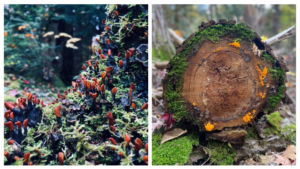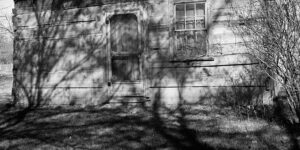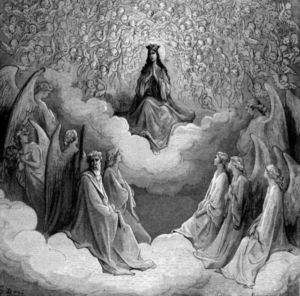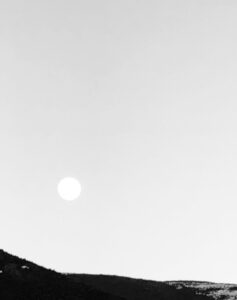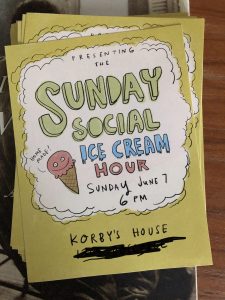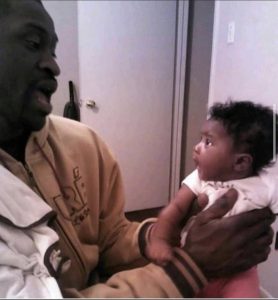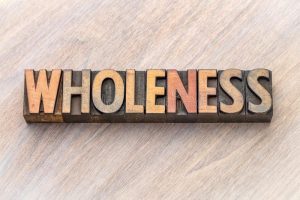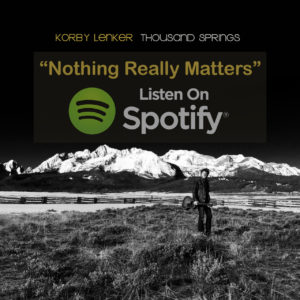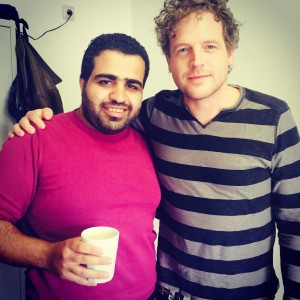Korby Lenker
Sunday, February 20th, 2022
February 20, 2022“What’s the difference between a prison and a monastery?” Dass would ask. The answer: “Almost nothing. Both are filled with people who are alone in their cells all day, far from the world. The difference is that for the monks it is heaven, for the prisoners it is hell.”
-Ram Dass
[Feast for the Soul]
‘Something hard.’
I come back and pour two whiskeys neat and we stand in the kitchen and talk about it all, the dreams, the making the dreams happen and then we toast ourselves and our dreams and the pushing as hard as we can against the inevitability of death because that’s just what you should do with your once and only life.
-Korby Lenker
‘From Inside the Monastery’
This is not some simplistic “change your mind, change your life” solution. I can’t opt out of my corporeal reality; I don’t have the spiritual muscles to lift myself out of physical discomfort. So I have to learn to hold both: to be in great pain and, at the same time, to find some small respite. I can’t wait for dreamy, poetic moments of inspiration (as when the above image—of a roseate spoonbill holding me in an inflatable lifeboat—occurred to me), but work very hard to seek them anywhere and everywhere I can. And wonderfully, when I start looking, I find them more often. I feel them more often.
-Sulieka Jaouad
‘Look Down, Get Low, Think Small’
I once walked through the world with such certitude, convinced by what lay before me. Now I know reality comes in layers, complex and delicious. Crawling around the forest floor has slowed me down, brought me closer to the earth, and made me somehow braver. How can our world be so scary when there’s more beauty in a square foot of forest, more wisdom than we’d expect in an acre? Humbled, heart opened, desirous, now when I step outside I look down, get low, think small.
-Joanne Proulx
This love is actually part of you; it is always flowing through you. It’s like the subatomic texture of the universe, the dark matter that connects everything. When you tune in to that flow, you will feel it in your own heart — not your physical heart or your emotional heart, but your spiritual heart, the place you point to in your chest when you say, “I am.”
-Ram Dass
Pure
J
O
Y
☆҉
When you need it, loop it. :)
-dayle
Very.
March 28, 2021“Stay passionate and let’s do what we can to lift each other up! Life is so short.”
~Korby
Escalante, Utah, 1936. Dorthea Lange. Village dwelling.
‘What brings us to tears, will lead us to grace. Our pain is never wasted.’ -Bob Goff
It’s hard for us religious people to hear, but the most persistent violence in human history has been “sacralized violence”—violence that we treated as sacred, but which was, in fact, not. Human beings have found a most effective way to legitimate their instinct toward fear and hatred. They imagine that they are fearing and hating on behalf of something holy and noble: God, religion, truth, morality, their children, or love of country. It takes away all guilt, and one can even think of oneself as representing the moral high ground or being responsible and prudent as a result. It never occurs to most people that they are becoming what they fear and hate.
-Richard Rohr
Release the fear. Then, hate dissolves. What remains? Only love. -dayle
More from Fr Richard:
Simplicity of lifestyle and freedom from the competitive power game, which is where it all begins. It is probably the only way out of the cycle of violence.
I am like one, who sees in dream, and when the dream is gone an impression, set there, remains, but nothing else comes to mind again, since my vision almost entirely fails me, but the sweetness, born from it, still distils, inside my heart.
-Dante/Paradiso
Ketchum, Idaho. March 27th, 2021
Full Moon/Power Path:
‘…keep your focus on beauty and what is good in your life. Trust your intuition and your heart and always come from a place of compassion and love.’
Korby Lenker.
October 18, 2020
|
A note from Korby.
June 4, 2020Suspending my creative promotions for a moment.
The murder of George Floyd is something we can’t ignore. All of us feel that. If you watched the video of Mr. Floyd’s last moments on earth or even just saw that brutal, incendiary image of the officer’s knee crushing his neck, there is no looking away. The question has been forced.
The question: is it in any way acceptable for an officer of the law to kill a man — unarmed and handcuffed and pleading for mercy — in broad daylight with no provocation whatsoever?
The answer is no. It is not okay. In the name of the most basic definition of human decency, we demand justice for George Floyd.
But then there’s something more.
That photo. The white man’s knee, the black man’s gasp.
I can’t pretend to know what’s in your heart but I can look into my own. The question I keep asking myself is: to what degree am I complicit in George Floyd’s murder?
Sure I wasn’t there at the corner of Chicago Ave and East 38th in Minneapolis. But the fact remains that I am a benefactor, an inheritor of centuries of white privilege, white provision. The law purports Liberty and Justice for All, but even after two centuries of reform, the law is on my side first.
That officer’s knee was in my name. Me. The soft child of the American family, indulged and coddled.
A few freedoms I know and can name: I’m blind to most. I take for granted the world through which I move, as though it were my birthright.
But what would it be like not to have the whole system of justice and economic invention arranged like an armed phalanx behind you? What is it like to be black in America? I cannot know.
But I can listen.
That there are white folks like me awakening to the knowledge of not only our collective biases, but more importantly, the consequences of those biases, is perhaps cause for a quavering hope. It won’t give George Floyd his life back, or Breonna Taylor hers, or restore Ahmaud Arbery, Donnie Sanders, Tony McDade, or the extinguished lives of countless others. It might yield the imperfect consolation of justice. But what next?
What after?
The sense I’ve gotten from talking with my friends and family is that the spirit is willing, but the way forward is uncertain. It’s hard for an individual person, however well-meaning, to know what to do, where to start. I’m not sure whether a post, or a hundred posts, will add up to anything truly meaningful. I don’t know.
Change begins in the heart. Okay fine. But what does that mean? What does change actually look like? I can say any number of things to ally myself with people of color, but is that really a solution? Talk is cheap.
Voting change into office will help. Let’s get busy doing that.
But I’m looking for something personal. I think we all are. It’s not just about police brutality. It’s about wanting to be whole. Whole individuals. Whole people. A whole nation.
Well, what’s possible?
Let’s for once allow ourselves a wild hope. Let’s dare to concede the possibility that maybe, somewhere in the future there’s an integrated America, where Black Lives Matter, where the rights of each individual really are extended to all.
At the very least, maybe it’s possible to be a little more whole.
I’ve been quiet the last few days, mulling over this question. Reading a bunch of different perspectives. Trying to get my thoughts in order. Praying about it.
What would it look like to be a little more whole?
And this is where the death of George Floyd has shined a light in a dark corner of my own heart.
See, I live in a mixed neighborhood in East Nashville.
While its gentrification has been going on for more than fifteen years, I still have neighbors of color. Close neighbors. Two of the houses within a hundred feet of me are occupied by black families.
I have lived in this house for almost five years. I love living here.
But wait. Do I even know my black neighbors’ names?
No.
We have been living in parallel universes.
Worse, there are little kids in the family of one of those houses. What am I teaching them, by never saying hello when I see them playing in the yard? By them never seeing me talk to their parents?
I’m teaching them that white people don’t see them. They are invisible.
By the sheer act of being unneighborly to my literal neighbors, I’m participating in the furtherance of this no-longer-acceptable status quo.
There are other ways I, I know. But allow me to focus on this one for a second.
The question is, who is us? You draw a circle, everyone inside it is us. Great. But where is the boundary — the place where us ends and them begins? How big can we make the circle? I don’t know the answer to that question. But I think, where I live, I can expand my circle of us, even if just a little bit.
When I was a kid growing up in Twin Falls Idaho, it would sometimes happen on summer evenings that my dad would fire up the home made ice cream machine.
There is nothing as distinctive as the nasal whine of the buzzing motor cranking that frothy mixture of milk and sugar into something thick and sweet and frozen. The sound would fill us kids with anticipation. Shivers in our bellies.
Ours was a cheap unit and my dad would have to sit next to the machine on a chair and free up the motor with his hands when it would stall. After a half-hour or so he’d lift the frosty cold canister from the wooden bucket of rock salt and ice. Suddenly all the neighbor kids would magically appear in our driveway. My mom would hand out bowls and spoons and we’d eat our fill as fast as our mouths would let us. It was an unqualified joy.
So I’m going to try something. An experiment.
My friend Laura helped me make a few little handmade flyers. Yesterday I started handing them out to the people on my street — knocking on doors, inviting them to my house this coming Sunday, for an ice cream social.
Just, pop over for a bowl of homemade ice cream and say hello. Everyone welcome.
I have all kinds of neighbors. Young families, white folks, black folks, famous musicians, student renters, a couple people I’m pretty sure voted for Trump. All of us living right next to each other, basically never communicating beyond a wave from the sidewalk.
But what would it look like if we — for the time it takes to eat a little ice cream — act like the neighbors we are, for one hour, one time? I say let’s try it.
The Sunday Social Ice Cream Hour. Folks will come at 6. We’ll be done by 7:30 at the latest. Maybe a lot sooner if no one comes!
Either way I’m gonna do this again and again. I can be fairly relentless when I’ve made up my mind.
It might be amazing. It might be awkward. I don’t know!
The thing is, we have nothing to lose. It’s clear that doing what we’ve been doing is no longer acceptable. For me, change begins at seeing what’s in front of you. Seeing who’s in front of you. Just saying “Hey! What’s Up? Who are you?”
I’m not trying to claim this is the answer. But it might be an answer. To see if we can draw that circle a little bigger. White people living in mixed neighborhoods have a unique opportunity in this critical moment.
And that’s what I have felt these last few days: if not me, who?
Hey man, come over to my house. Bring your kids. Let’s hang out for a few minutes.
Maybe it’s a start. The invites are out. I’ll let you know how it goes.
I’m sorry Mr. Floyd. You didn’t die in vain. My prayer is that some small good can come of this. Maybe we can be a little more whole.
Korby is a writer/producer and singer/songwriter. He currently lives in Nashville.
George Floyd with his baby girl, Gianna.
A gofundme fundraising page has been created for Gianna.
https://www.gofundme.com/f/gianna-floyd-daughter-of-george-floyd-fund
From author Seth Godin:
“When a problem appears too large, too intractable and too unspeakable to deal with, it’s easy to give up.
There never seems to be enough time, enough resources or enough money to make the big problems go away.
Perhaps we can start with a very small part of it. One person, one opportunity, one connection.
Drip by drip, with commitment.”
Korby’s single.
June 7, 2017Korby:
“If you have some leftover firecrackers from your childhood, light one off for me. Today is a day of celebration because the first single from my new record is now up on Spotify. I’m very proud to bring you “Nothing Really Matters”
I wrote this song with my friend Stoll Vaughan. The inspiration came while I was on the road – I had the night off in Tampa, Florida and was hanging out on the boardwalk. It was like how you think it would be. The sun was setting, seagulls flying around, crying, bickering. Young lovers holding hands, kids eating cotton candy, that kind of thing.
I had nowhere to go so I just walked along, checking out the scene. Toward the end of the boardwalk I came across this young girl playing fiddle tunes, by herself, just kind of lost in the music – fiddle case open, a few coins and small bills in there. She looked a little rough. Her long dark hair hung in front of her face and there were small tattoos on her fingers. I watched and listened and it was immediately clear that she was good. She had that shuffle. Its the thing that’s either in you or it’s not, and it was spilling out of her like wine at the end of a party.
I recognized the fiddle tunes – Red Haired Boy, Whiskey Before Breakfast, Billy in the Lowground – it was obvious she’d grown up in the old time music. She had that way of playing that makes you smile.
I listened for a few minutes before I noticed I wasn’t the only one. Behind the girl, facing out toward the ocean and the seagulls, was an old man. He was leaning against the railing with his rounded shoulders and his bone white hair poking out from beneath a faded fishing cap.
He was pretending to watch the sunset, but I could tell he was really just listening to the tattooed fiddler. Something about the way he stood. Completely still, like someone paying close attention. Every now and then he would cast a glance her way, and turn right back toward the water. I looked closely and there was the tiniest tapping of his foot. A very private matter.
There were people everywhere, moving along down the boardwalk – mostly ignoring her, completely oblivious to him. I felt like I was being let in on a secret. I watched him listen, and I listened to her play. It was a perfect love story, beautiful and sad. He was there for the fiddler and her lonely music, and she had no idea.
I thought about that old man for a long time. I felt like he should have a song written for him. Nothing Really Matters is what came out.”
A human perspective.
October 7, 2015The Syrian refugee camps are more than numbers, they are people with stories. Singer/songwriter and Sun Valley favorite Korby Lenker visited a camp one day while performing in Germany. He and a friend rode their bikes out a camp, not knowing what they were doing, or what they would say, or if anyone could speak English. Then they found Muhammad. This is his story. And their connection.
‘This is my new friend Muhammad. He’s a Lebanese-born Palestinian who worked for a news program in Syria before everything went to hell and he fled to Germany. We met here, in a small town called Lüneburg.
I’m sleeping in a house down the street for the next few days. What happened was, this morning over coffee my friend Jas told me the city had accepted several thousand refugees and that they were living in two separate camps at the edge of town. She said one was close by – we could get there by bike. So we got on the bikes and went. Neither of us was sure what I had in mind.
We biked through a forest and past a jail and alongside a cornfield and then we were there. A metal fence surrounded what looked like ship containers, white, with a little square window cut into each one. Jas and I stood outside the fence, straddling our bikes, hesitating. It was a nice day, warm and clear. She looked at me like what are you thinking here pal so I said, “Maybe we just go inside and ask the first person we see if they speak English?”
“Or German,” she added.
Yes. So we pushed our bikes through an open gate and up to one of the open doors at the entrance to a container house. The area felt deserted. I could hear noises inside the buildings, but outside it was pretty empty. Short dry crabgrass filled the small courtyard. A couple kids were pushing something around on a blanket. A guy leaning against a wall was talking on his cell phone.
I kickstood my bike and looked inside the door, but it was just a long empty hallway. Unclear the way forward.
Definite moment of awkwardness here. Borderline trespassing. Maybe I shouldn’t have left my passport back at the house. I avoided Jas’ eyes because I imagined she might be a little uncomfortable and I knew if I saw the discomfort I would have to do something conciliatory, like leave.
Suddenly the guy on the cellphone had finished talking and was heading back toward the container house, toward us.
When he got close I said “Hey.” Then I said, “Do you speak English?”
“Yes,” he said and stopped walking. He had large eyes with heavy lashes and close-cropped tight curly hair. Also he smiled, which is all I ever ask for really when I wander into a stranger’s home uninvited, so I said, “Hey cool. Well, I don’t know what I’m really looking for, I just wanted to say hello to —”
Then I was like, well what are you trying to do here Lenker? Come and gaze at the real-life dispossessed so you can put another adventure in your bag? Is this man and his story the next souvenir to go into your suitcase, beside the gummy bears and Ampelmånnchen? Do you think you are going to actually help him?
And then I thought, well probably not, but it would be fun to play ping pong with someone here. Maybe he plays ping pong.
So I said to Muhammad, “I guess I was looking for you.”
“Well you have found me,” he smiled with all the teeth. “I am here visiting my friends. You will come with me?”
I looked at Jas. She seemed to be down for it.
I said: “We would love to do this.”
So he lead the way and we followed him into the container ship house that was actually a dozen container ship houses stacked side by side connected by a long white hallway. Manufactured everything. But clean. Very new. No ping pong tables anywhere, but there were plenty of other things going on so I was feeling okay about it.
We walked past a dozen or so open doorways and in each, I saw a man or a handful of men, sitting on beds and chairs, sipping what I assumed was tea. Some wore tunics, some old-looking jackets. A gathering theme was not forthcoming. Beside the two kids outside, I didn’t see any children. No women in sight anywhere.
Finally Muhammad stopped in front of one of the doors and made an unfamiliar gesture I took to mean enter here. So I entered here and Jasmine followed. There were three other men, all older than our new friend, sitting around an boxy old-style television. One wore a white hat like a baseball cap with the brim missing. The tv was tuned to the Al Jezeera channel. I could tell because Arabic writing filled the bottom of the screen. The subject being discussed must have been the recent drone strikes the UK had done on those guys who fled to fight for ISIS because it was showing clips of the British house of commons. I recognized the footage as the same I had seen on the BBC channel in the hotel I stayed in in Cardiff two days before.
It’s not like I sat and stared. I saw this for one second and then who cares, because there were real people in the room.
An old man stood up and shook my hand. His skin was dark and his face looked unnaturally smooth with sharp straight lines etched in it like he had been burned all over. I didn’t ask. Muhammad gestured I should sit on the bed and he pulled a seat up for Jas and then the man with the burned skin stood up and walked across the room and picked two enormous bruised bananas out of a basket and handed one to each of us. It was all very easy going.
These people had known me for less than one minute and they were just opening up their home to us and here’s some fruit and okay let’s talk. So we talked. I asked Muhammad his story and he told me in mostly perfect english about his journalism background, his term at the news program in Syria which he named and I have forgotten. He said ever since coming to Germany months ago (he was in an earlier wave than the most recent) he spent his time learning German and helping his friends send emails to the embassy and navigate the considerable sturm and drang that precedes legal immigration.
He asked me where I was from. I said Nashville. His expression said he had never heard of it.
I asked him where his family was. He said they were all back in Lebanon, waiting for an appointment with the embassy February 16. I could tell the date had great weight. It was the only really specific thing he said.
“Do you think you will ever go back?” I asked.
“No,” he said. “I am here until forever.”
When I asked him if he felt like he was starting over he didn’t understand what I was saying. Jas said to ask him a different way.
“Beginning again.” I said. “Do you feel like you are beginning again?”
“That is it,” he said the large eyes glowing. “I am learning German. I am getting better at English. I am beginning again.”
I’m not trying to make a hero out of him. I think I just want to point out that he was, well, a person. A normal, intelligent man facing a way more difficult situation than you or I will probably ever endure. And he was meeting the challenge and helping out his friends and he also had time for some idle chatter with people who couldn’t really actively help him in his cause. We were just hanging out.
We talked for awhile and I ate what admittedly was a pretty far gone banana and then that was done and Jas said we had to go rent my PA system for tonight’s show. Muhammad and I traded numbers, email, Facebook and I fully expect to hear from him again soon.
Who knows where it’s all going? I just asked him if he spoke English.’

